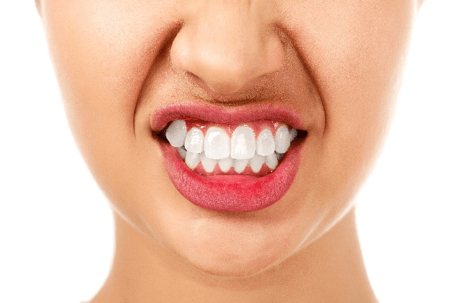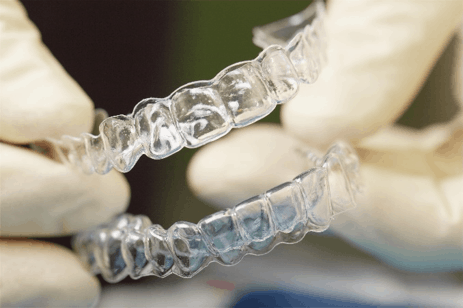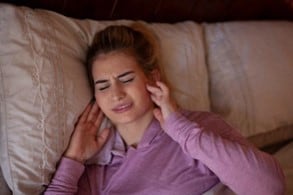
Bruxism, or chronic teeth grinding or jaw clenching, is extremely common and can occur at any age. Many people grind or clench at night and are not aware of what they are doing. Bruxism can cause jaw soreness, headaches and other symptoms. Unfortunately bruxism is also very harmful to the teeth and can lead to dental injury. If you grind repeatedly, your tooth enamel can wear down from the forces of clenching or grinding, and your teeth can crack, chip or even break. Existing restorations like bridges or crowns can break and require replacement. Chronic grinding or clenching can also aggravate your jaw joint and lead to jaw pain, clicking or popping noises when opening the jaw and other problems.
If you grind or clench at night, it may seem as though you have no control over your habits. Although Dr. Ashwini Bhave cannot help you completely stop grinding or clenching in your sleep, she can suggest lifestyle changes to reduce the occurrence of nighttime grinding or clenching. Furthermore, Dr. Bhave can prescribe treatment to protect your teeth from the pressure of bruxism and preserve your smile.
Custom Night Guard for Teeth Grinding
A splint or bite guard worn at night is a mainstay for sleep bruxism. A night guard does not stop you from grinding or clenching, but it acts as a barrier or buffer between your teeth as you grind or clench in your sleep. Made from hard plastic, the appliance is worn over your upper or lower teeth. It protects your tooth enamel and prevents the teeth from chipping, cracking, wearing down prematurely and flattening. A night guard can also help prevent your gums from receding and improve or relieve jaw pain.
Stock or off-the-shelf night guards may seem like an easy, accessible option; however, they are universally bulky, fit poorly, break down quickly and can interfere with breathing. If a stock night guard doesn’t feel good, you probably won’t wear it. If you do, it might cause your teeth more harm than good.

Custom-fitted night guards offer a better fit and better protection. Your custom night guard is constructed from top-quality materials to the exact shape and placement of your teeth. Dr. Bhave takes impressions of your teeth and sends detailed instructions to the dental laboratory responsible for constructing your night guard. She only works with the leading dental labs to ensure well-fitting, quality night guards.
Once your night guard is ready, Dr. Bhave has you try it on in our office and checks its fit. She can make any minor adjustments to ensure a comfortable fit and a proper bite. If needed, she can even have the night guard remade. The goal is for your night guard to fit comfortably, offer excellent protection and last a very long time.
Restorative Dental Care for Bruxism
If bruxism has led to excessive enamel wear or dental injury, Dr. Bhave can repair or rebuild your compromised teeth. This could include replacing damaged restorations, placing new ones or taking other measures to restore your teeth to their normal shape and function. Dr. Bhave cares deeply about the appearance and health of your smile and will recommend the most suitable course of action.
Causes of Teeth Grinding

Cost of Bruxism Treatment
Custom night guards are several hundred dollars. While they are more expensive than over-the-counter options, because they are built specifically for your mouth, the fit allows for more comfortable sleep and provides better protection for your teeth. In the long-run, having a professional-grade night guard can save you thousands of dollars in dental damage.
Insurance plans may cover some or all the cost of night guards; our team will help you to get the maximum reimbursements you are entitled to.
If restorative and cosmetic dentistry is recommended due to existing damage from teeth grinding, the price of treatment will depend on which procedures are needed. Dr. Bhave will discuss those costs during a consultation. Bay Area Dental Specialists accepts financing options through CareCredit if making monthly payments is preferable to paying in one lump sum.
Teeth Grinding FAQs
What if I’m unsure whether I grind my teeth at night?

Can I try wearing a sports mouth guard instead of a night guard?
While you may be tempted to use a sports mouth guard to try to save money, these kinds of mouth guards are larger and usually uncomfortable to sleep in. You may even find it makes breathing more difficult while you sleep. The materials used to make sports mouth guards are not adequate at stopping grinding from occurring at night. Wearing a sports mouth guard long-term can even alter your bite, which in turn may necessitate expensive dental treatment in the future.
Is bruxism the same thing as TMJ?
TMJ (temporomandibular joint) disorder is a condition characterized by jaw pain, but it is not the same thing as bruxism. While TMJ pain can be the result of bruxism, it can also be attributed to other causes.
What can I do to stop bruxism?
Lowering the amount of anxiety you experience can go a long way toward minimizing teeth grinding. Meditating, attending therapy and exercising are also useful ways to manage stress. Quitting smoking and cutting out alcohol and caffeine may also help you to stop unconsciously clenching your teeth.
Should I be concerned about my child grinding her teeth?
Teeth grinding is common among children when their teeth first come in — both baby and adult teeth. Once these teeth have come in fully, this habit usually stops. If you notice grinding and clenching during these periods, there is no reason for alarm. However, if the problem persists, please speak to Dr. Bhave about potential solutions for preventing pain and damage to the teeth.
Is Botox® an effective treatment for teeth grinding?
Botox has been studied as a treatment for teeth grinding because it can relax the jaw muscles that cause clenching. Some patients experience less tension and fewer headaches after receiving Botox.
However, Botox doesn’t physically protect the teeth from damage caused by grinding.
A custom night guard remains the most reliable option for protecting enamel and preventing chips, cracks, and premature wear. For many patients, Botox could be a supportive treatment, while a night guard serves as the main form of protection.
Are over-the-counter night guards effective?
Over-the-counter (OTC) night guards can provide some relief, but they are made to fit a wide range of mouths. Unfortunately, that means they don’t actually fit anyone very well. OTC night guards often feel bulky and very uncomfortable.
Because they are not custom-fitted, they may not stay in place and usually don’t provide full coverage or durability. When Dr. Manassra designs a night guard for your mouth, it’s specifically for your bite. This offers comfort and long-term protection that store-bought options cannot match.
What is the difference between a soft and a hard night guard?
Soft night guards are flexible and usually best for mild teeth grinding. They are comfortable but wear out more quickly. Hard night guards are made from durable acrylic and are designed for moderate to severe grinding.
Some patients benefit from hybrid night guards, which combine a soft inner layer with a strong outer surface for both comfort and protection.
How long does it take to see improvement with a night guard?
Relief can happen quickly once a custom night guard is used consistently. Many patients notice reduced jaw soreness and less tension within the first week. If other therapies are used alongside a night guard, such as stress management or muscle relaxation, results may continue to improve over several weeks.
Will bruxism go away on its own?
In children, teeth grinding sometimes decreases with age. In adults, bruxism rarely resolves without treatment. Without a night guard, teeth are left vulnerable to cracks, wear, and jaw problems. Early treatment is the best way to prevent long-term damage.
Is bruxism related to sleep apnea?
Research suggests that bruxism and sleep apnea can be linked. Teeth grinding may occur as the body’s response to interrupted breathing during sleep. If sleep apnea is suspected, it’s important to address both issues. A night guard can protect your teeth while medical treatment addresses the breathing problem.
Can diet or supplements help reduce bruxism?
Some patients find that cutting back on caffeine, alcohol, or tobacco helps reduce grinding. Supplements such as magnesium are sometimes suggested for their role in muscle relaxation, but evidence is mixed. Even with lifestyle changes, a night guard is still the most dependable way to protect your teeth.
Do sleep tracking apps help detect teeth grinding?
Sleep apps and devices may record noises related to grinding, but they are not always accurate. A professional dental exam is the best way to diagnose bruxism. Dr. Manassra can spot signs like enamel wear, jaw tightness, or gum recession and recommend a custom night guard tailored to your needs.
Can stress management help with teeth grinding?
Yes. Stress and anxiety are common triggers for bruxism. Relaxation techniques like meditation, yoga, or counseling can help reduce clenching.
However, stress management alone does not prevent tooth damage. Combining healthy stress habits with a night guard is the best way to safeguard your smile.
Schedule a Consultation with Dr. Bhave
If jaw soreness, headaches, flattened teeth or other signs indicate you grind or clench your teeth at night, Dr. Bhave can help. Call or email our practice to request an informational consultation with her today.



